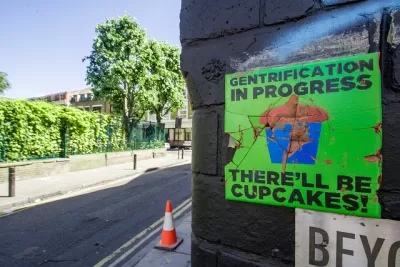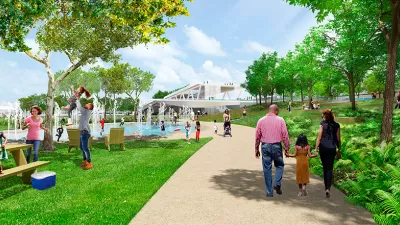“We could use some gentrification here.” Let's never say this—we must refrain from debating the long-term likelihood of gentrification in distressed places.

Does this sound familiar? A persistently poor, highly distressed, and long-screwed-over neighborhood is organizing around, lobbying for, or about to get some kind of reinvestment and someone raises the specter of gentrification. Those supporting the reinvestment get frustrated and say something along the lines of “Are you kidding? This place will never gentrify!” or “We could use some gentrification here.”
I think this particular exchange is one we should all commit to never having again.
Why You’re Both Right About Gentrification
Those who dismiss concerns of gentrification have some data behind them. Rapid housing cost appreciation and demographic turnover is a very real and growing problem, but it is still concentrated in a few high-cost markets, and a few select neighborhoods of other cities. Most poor census tracts have stayed stubbornly poor for decades, and more have slipped into poverty recently than climbed out of it.
Housing affordability and displacement are actually problems everywhere, but in most places it’s not due to gentrification. Many of the people who are frustrated when gentrification is brought up see the topic as part of a coastal/hot-market narrative that leaves their places out, and gives them policies that aren’t relevant for their realities—like hot-market centric inclusionary housing policies or funding models that don’t account for an appraisal gap. They worry that the very real, current needs of places being left behind are going to be sacrificed by fear of some unlikely future scenario.
Those who raise the concern also have a point, though. First, we should all remember that in the 1970s, the idea that New York City—especially the Bronx and much of Brooklyn—would gentrify was laughable. Or Hoboken and Jersey City.
FULL STORY: It Doesn’t Matter if Your Neighborhood Is Going to Eventually Gentrify

Planetizen Federal Action Tracker
A weekly monitor of how Trump’s orders and actions are impacting planners and planning in America.

Congressman Proposes Bill to Rename DC Metro “Trump Train”
The Make Autorail Great Again Act would withhold federal funding to the system until the Washington Metropolitan Area Transit Authority (WMATA), rebrands as the Washington Metropolitan Authority for Greater Access (WMAGA).

The Simple Legislative Tool Transforming Vacant Downtowns
In California, Michigan and Georgia, an easy win is bringing dollars — and delight — back to city centers.

Albuquerque’s Microtransit: A Planner’s Answer to Food Access Gaps
New microtransit vans in Albuquerque aim to close food access gaps by linking low-income areas to grocery stores, cutting travel times by 30 percent and offering planners a scalable model for equity-focused transit.

This City Will Pay You to Meet Your Neighbors
A North Kansas City grant program offers up to $400 for residents to throw neighborhood block parties.

Commentary: Our Silence Will Not Protect Us
Keeping our heads down and our language inoffensive is not the right response to the times we’re in. Solidarity and courage is.
Urban Design for Planners 1: Software Tools
This six-course series explores essential urban design concepts using open source software and equips planners with the tools they need to participate fully in the urban design process.
Planning for Universal Design
Learn the tools for implementing Universal Design in planning regulations.
Smith Gee Studio
City of Charlotte
City of Camden Redevelopment Agency
City of Astoria
Transportation Research & Education Center (TREC) at Portland State University
US High Speed Rail Association
City of Camden Redevelopment Agency
Municipality of Princeton (NJ)




























